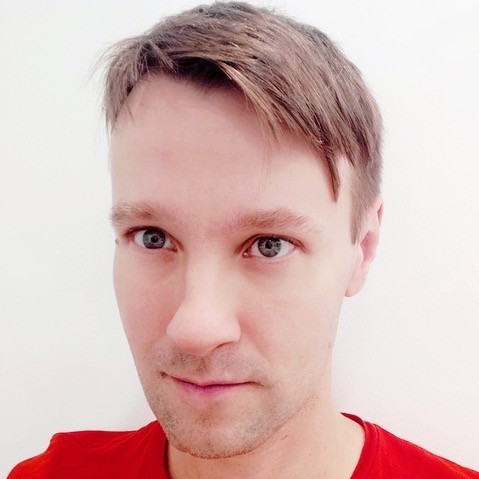Confirmed Panels
PANEL on Day-2, Wednesday, 17 November 2021
In-booth CAI tool support in conference interpreter training and education
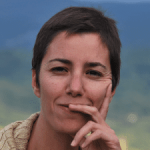
Susana Rodriguez
Author
and
Panel Moderator
Panellists:
For bios click picture or scroll down
Technology has long been one of the key drivers of change in the interpreting profession (Fantinuoli, 2018). Thanks to the recent integration of ASR and AI technology into computer-assisted interpreting (CAI) tools, ICTs now have the potential to enhance simultaneous interpreting (SI) performance in areas commonly prone to human error. It is considered that high-quality conference interpreter training should incorporate new technological developments (Melchor, Horvath & Ferguson, 2020). However, training on in-booth CAI tool support is still an underrepresented topic in the field’s discussions.
This panel focuses on the inclusion of in-booth CAI tool support into conference interpreter training and education and aims to foster dialogue on the inherent needs and challenges. The integration into the training curricula, educational objectives, best practices and the role of research will be among topics discussed. Panellists will share their expertise in conference interpreter training in professional and educational contexts where technology is both a medium of teaching and its very objective — as in CAI tool training. The moderator of the panel hopes that the discussions will pave the way for further progress towards a pedagogically sound integration of in-booth CAI support into conference interpreter training.
Susana Rodríguez M.A. is a freelance conference interpreter and independent researcher focusing on the development of language technology applied to conference interpreting. Susana has headed the Master’s Degree in Conference Interpreting of the University of Murcia UCAM and she is an ISO expert in the development of international standards for interpreting services and interpreting technology. She holds an Entrepreneurial Excellence for Strategic Growth degree by the UCLA Anderson School of Management and has co-founded two companies. She also holds an expert degree on Management and Promotion of International Research & Innovation Projects by the Technical University of Madrid UPM and she is the Activity Leader of the Innovation Activity SmarTerp (www.smarter-interpreting.eu) funded by the EIT Digital, supported by the European Institute of Innovation & Technology, a body of the European Union.
For the bio text of the panellist see Biography dropdown beside their respective pictures.
Outline of the key issues to be discussed
○ Integration of in-booth CAI support into existing CI curricula: main challenges and opportunities;
○ Pedagogical objectives related to in-booth CAI tool training and the possible contribution of research;
○ Teachers’ and trainers’ skills development in view of in-booth CAI tool integration into CI pedagogy;
○ In-booth CAI tools integration in International Organisations and its consequences for CI training;
○ Aptitude testing of prospective students for CAI tools integrating programmes;
○ Tools needed for training on in-booth CAI support: prospective developments.
For biographies of panellists click a picture above or scroll down
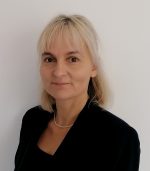
Ildikó Horváth
Ildikó Horváth PhD, habil. holds an MA in English and French language and literature. She is a senior lecturer, director of the Institute for Language Mediation, head of the Interpreter and Translator Training Department of Eötvös Loránd University, Budapest. She is an active freelance conference interpreter and president of the European Masters in Conference Interpreting (EMCI) Consortium. Her main research interests are Interpreting Studies, which she has developed in Hungary within the framework of the Translation Studies PhD Programme of the Linguistic School of Doctoral Studies at ELTE University. She has published several articles, monographs and edited volumes in English and Hungarian.
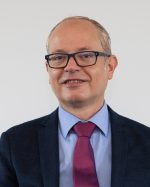
Javier H. Saseta
Javier Hernández Saseta is Head of the Multilingualism and Knowledge Development Unit at the Directorate-General for Interpretation (SCIC) of the European Commission. He obtained two bachelor’s degrees in Romance Studies and Law, as well as a master’s degree in Conference Interpreting at the University of La Laguna. In 1992 he started working as a professional conference interpreter in the Spanish booth at the European Parliament, and in 1995 he became a staff interpreter at the European Commission, where he has been working until now. He has taken on many different roles at SCIC – for instance, he was the coordinator for the Spanish Presidency and he is responsible for the organisation of the annual SCIC-Universities Conference. He has also worked as Assistant to the Director General and has been Head of the Internal Communication Unit. He is currently Head of the Multilingualism and Knowledge Development Unit and is responsible for the relations with universities, and the Knowledge Centre on Interpretation, among others.
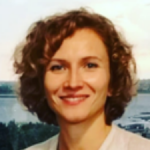
Alicja Okoniewska
Alicja M. Okoniewska Ph.D. is Associate Member of ISIT Lab at the Institute of Intercultural Communication and Management (ISIT) in Paris. Her research interests focus on socio-cognitive aspects of conference interpreting, computer-assisted conference interpreting, multimodal analysis of inter-lingual mediated discourse and multilingual political discourse analysis in institutional settings. She is a member of the Research Committee (RC) and the Taskforce on distance Interpreting (TFDI) of the International Association of Conference Interpreters (AIIC), former Academic Director of Conference Interpreting and Discourse Analysis Department at ISIT and EU accredited conference interpreter and trainer. Finally, Alicja is Scientific Research Project Advisor at the European Research Council Executive Agency. The views expressed are purely her own and may not in any circumstances be regarded as stating an official position of the European Commission.
Francesca M Frittella is a conference interpreter — It (A), En (B), De (B), Zh (C) — researcher and trainer.
She is the author of several publications on the SI of numbers and the first usability study on an ASR-powered CAI tool.
Her PhD (ongoing) at Shanghai International Studies University focuses on the integration of Instructional Design into conference interpreting pedagogy with the integration of CAI tools into the SI process as a case study.
She develops and teaches custom-made online workshops and courses based on her research for universities and professional associations across Europe and beyond.

Bianca Prandi
Bianca Prandi is completing her Ph.D. studies at the University of Mainz/Germersheim. Her dissertation explores the impact of computer-assisted interpreting (CAI) tools on the cognitive subprocesses in simultaneous interpreting. Her research interests are human-machine interaction in interpreting (in particular, computer-assisted interpreting), automatic speech translation (machine interpreting), terminology management for interpreters, interpreting cognition, and translation process research. She is a member of the European Society for Translation Studies.
Since 2015, she has been providing research-based training on CAI tools for professional associations (e. g. VKD im BDÜ e.V., AIIC, AITI) and interpreter training institutions (e. g. EMCI member universities, University of Trieste, University of Vienna). She is a guest instructor for the Certificate Course Interpreting with New Media at the Postgraduate Center of the University of Vienna, where she teaches classes on CAI, remote simultaneous interpreting, and the integration of CAI tools into the SI process, specifically during RSI.
She is the co-founder of InterpreMY, an online academy that provides research-based on-demand courses and personalised coaching for interpreters and interpreting students. A practicing conference interpreter and translator, she is a junior member of the German Association of Conference Interpreters (VKD im BDÜ e.V.).
PANEL on Day-3, Thursday, 18 November 2021
Panel on automation of translation workflows

Joanna Gough
Co-Author
and
Panel Moderator
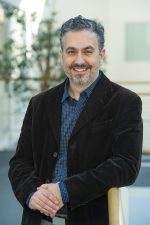
Félix do Carmo
Co-Author
and
Panel Moderator
Panellists:
For bios click picture or scroll down
The purpose of this panel is to bring together a varied group of specialists to discuss automation in the world of professional translation. The benefits of the automation of production processes have been widely commented on in publications, communication outlets and events in which the localisation industry is represented. At the same time, there is an increasing volume of research that analyses the effects of technology across the industry, reflecting on the quality of the industry products and raising ethical concerns over the perceptions of the value of human work.
This panel will create a timely opportunity for academics, practitioners, industry representatives and consultants to openly discuss these and other effects of the automation of translation workflows. We aim at raising questions that are not heard in sales pitches and that invite reflections from voices often unheard in these discussions. The transformative nature of current technologies calls for a wide participation of the industry in the debate, as both elements of supply chains and people with responsibilities over management and business sustainability face uncertainties about the economic and social effects of the upcoming changes.
Joanna Gough holds an MA in English Philology from Adam Mickiewicz University, Poland and an MA in Translation from University of Surrey. In 2016 she completed her PhD which examined the patterns of interaction between professional translators and online resources. Shortly after that she was appointed as a Lecturer in Translation Studies at the University of Surrey. Joanna’s research interests encompass a variety of language and technology related subjects, such as tools and resources for translators, process oriented translation research, the evolution of the Web and its impact on translation and many more. Joanna is also interested in the business and industry aspects of the translation profession and is a keen advocate of cooperation between academia and industry.
Félix do Carmo is a Senior Lecturer in Translation and Natural Language Processing at the Centre for Translation Studies of the University of Surrey. He finished his PhD at the University of Porto, where he was a guest lecturer, after more than twenty years as a translator and a translation company owner in Portugal. He was then granted a two-year EDGE-MSCA fellowship to work as a researcher in Dublin City University, Ireland. He has published his work in international publications, such as Translation Spaces and Machine Translation. His research covers the translation process and translation technologies, besides professional workflows and ethics.
Some of the key issues we suggest for the panel are:
– Technology interoperability / integration / usability issues
– Tasks which are challenging to automate and require human input despite being ‘sold’ as automated (e.g. quality control, management of large/complex projects)
– Realistic limits to the automation of translation and/or revision work
– Ethical considerations of automation (e.g. data gathering for business intelligence, ownership of data, surveillance, automatic linguist selection, automatic text splitting etc.)
– Working conditions for translators (more challenging conditions due to lack of context and micro-tasking, depersonalisation of client relationships, downward pressure on rates, distributed working environments)
– Effects (positive and negative) of technology on translation product quality
– Consequences of the Covid-19 pandemic, especially the acceleration of automation processes.
We invited different stakeholders to take a holistic view of translation workflow automation. We can already inform you that we have received the confirmation of all the panellists.
The panel will be composed of:
- Anu Carnegie-Brown (Sandberg)
- Istvan Lengyel (Belazy)
- Jost Zetsche (freelance translator and technology expert)
- Gary Lefman (Senior Globalization Architect at Cisco)
- with Félix do Carmo and Joanna Gough (University of Surrey) as moderators
For biographies of panellists click a picture above or scroll down

Anu Carnegie-Brown
Anu Carnegie-Brown (Managing Director, Sandberg)
I empower people to achieve their language-related goals.
Since the mid-nineties, I have extended this leadership approach to students on university translation courses, to clients who rely on continuous localization services, to colleagues who constantly venture outside their comfort zone and to industry associations who innovate ways for us all to work together.
With 25 years of authentic experience as a C-suite professional at a language service company, my main expertise is in the Nordic market, creating and communicating strategy, building teams and growing translation companies from modest start-ups to streamlined organisations.
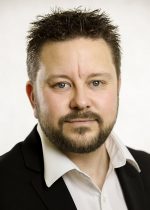
Gary Lefman
Gary Lefman (Senior Globalization Architect at Cisco)
Gary is a Chartered Engineer in software globalisation, an internationalisation evangelist and educator, passionate about continuous localisation. He is a Fellow of the Chartered Institute for IT and Fellow of the Institution of Engineering and Technology, with two decades of authority and leadership in software localisation. Gary earnt his MSc in Multilingual Computing and Localisation from the Localisation Research Centre (University of Limerick) and has a published book titled Internationalisation of People Names. He’s also a STEM ambassador and Code Club leader, enthusing children across the East Midlands in science, engineering, and computational thinking.

István Lengyel
István Lengyel (Founder and CEO of BeLazy)
István Lengyel is the founder and CEO of BeLazy, a technology startup aiming to unify the supply chain of translations through system integrations and automated project management. He is also a technology and process consultant for enterprises at Nimdzi Insights. Previously he was co-founder of memoQ, worked at On Global Language Marketing in customer success and process redesign, and also spent several years translating. He holds a degree in economics, a degree in translation and interpreting, and a PhD in translation studies. Originally from Hungary, he lives in Spain today.

Jost Zetsche
Jost Zetsche (freelance translator and technology expert)
Jost Zetzsche is a translation industry and translation technology consultant, an author on various aspects of translation, and an ATA-certified English-to-German technical translator. 1999 Jost co-founded International Writers’ Group, LLC, on the Oregon coast. Originally from Hamburg, Germany, he earned a Ph.D. in the field of Chinese translation history and linguistics at the University of Hamburg. Since 2016 he has been contracting with United Bible Societies to help create and curate the Translation Insights and Perspectives (TIPs) tool. In 2021 he published “Characters with Character: 50 Ways to Rekindle Your Love Affair with Language.”
PANEL on Day-1, Tuesday, 16 November 2021
Unedited (raw) Machine Translation:
Strengths and Limitations in your Use Case

Eleanor Cornelius
Author
and
Panel Moderator

Alan K. Melby
Co-Author
Co-Moderator
and Panellist
Panellists:
For bios click pictures
There is not much to say about the strengths and limitations of raw (unedited) machine translation in general, but a lot can be said when it is tied to a particular use case. There is a considerable amount of confusion these days regarding raw (that is, unedited) machine translation. Press releases about raw MT claiming “parity” with human translation have not helped.
One use case for raw MT is for the Microsoft Knowledge Base, which contains over 150,000 technical support articles. Using a process called P3 (post-published post-editing) by Chris Wendt of Microsoft, translations are published initially as raw MT, and errors are corrected later, as needed. According to Chris Wendt (personal communication to Alan Melby), this approach works because in this use case, the kind of mistakes made by the machine translation system do not matter. Another use case for raw MT is sometimes called triage, where raw MT is used in order to decide whether to send a text out for human translation.
There are other use cases where the kind of mistakes made by MT systems do matter. One example is annual corporate reports intended to impress stockholders. Another example is translation of instructions for the operation, maintenance, or repair of (heavy) machinery where mistakes can result in injury or even death.
It is important to avoid two extremes: arbitrary rejection of raw MT as never useful and over confidence in raw MT as a viable alternative to human translation or post-edited machine translation in all use cases.
Over confidence in raw MT can have business consequences. For example, there is an active lawsuit in the US that is connected with the use of raw MT and COVID assistance. See https://healthlaw.org/news/civil-rights-complaint-filed-over-discriminatory-provision-of-covid-19-services-to-persons-with-limited-english-proficiency/. One suggestion that is made in the Complaint is the following: “Advise entities not to use automated translation software that has not been verified by a qualified translator”.
This means that government agencies should not use raw MT in websites that contain important information. Hopefully, one of the panelists will be able to give an update on the lawsuit during the discussion.
LSPs have to decide what to say to customers who are thinking about using Google Translate or some other raw MT service instead of paying for translation services that include bilingual professionals in some way.
This panel addresses a question that is important to many stakeholders in the language industry.
Eleanor Cornelius is a an associate professor in the Department of Languages, Cultural Studies and Applied Linguistics at the University of Johannesburg. She is the coordinator of the Applied Linguistics cluster/unit in this Department.
She teaches courses in interpreting, psycholinguistics and text-editing at undergraduate level, and courses in psycholinguistics at honours level.
Eleanor is a currently the chairperson of the South African Translators’ Institute (SATI) and a SATI accredited simultaneous interpreter in two language directions. She also serves on the Council of the International Federation of Translators (FIT), where she serves on at least five taskforces. She represents not only South Africa, but the entire African continent, on the FIT Council.
She is an invited member of the International Working Group for Community Translation, and she has been a member of the Programme Committee of AsLing’s Translating and the Computer for a number of years.
She is frequently called up to review articles in scholarly journals, to rate researchers for the South African National Research Foundation, to externally examine master’s dissertations and doctoral theses, and also undergraduate and postgraduate courses at other universities.
Eleanor is best known for her research into the concept of plain language, and also her research into legal translation and legal language. In recent years, she has also become more actively involved in machine translation and its relation to, and consequences for, human translation, under the guidance and mentorship of fellow FIT council member, Prof Alan Melby.
Alan Melby is a certified French-to-English translator, vice-president of FIT (www.fit-ift.org), emeritus professor of linguistics, and president of LTAC Global (www.ltacglobal.org) a non-profit serving the translation profession and industry. For a more extensive bio see Alan Melby as Presenter of “Who needs an MQM Scorecard?”
[biographies of the panellists are accessible by clicking their pictures below]
This panel addresses a question that is important to many stakeholders in the language industry.
The panellists will present from their perspective, be it from the viewpoint of MT development, translation organisation/agencies, academia, etc.
The audience will be invited to ask questions after the initial presentations, and they will be prompted to identify their own use cases.
There will be a post-conference method of contributing use cases that are appropriate for raw MT or not.
Eleanor Cornelius will moderate the session with co-moderator
♦ Alan Melby who, as one of the panellists, will represent FIT and the human translator.
The panel will consist of the following people:
♦ Guillaume Deneufbourg (FIT / CBTI-BKVT (Belgian Chamber of Translators and Interpreters)): will represent translators.
♦ Markus Foti (Head of MT at DGT/EC): will represent MT developers.
♦ Chris Jones (Head of the press unit at CoR-European Committee of the Regions) will represent users of MT.
♦ Mary Nurminen (Tampere University, Finland) will represent researchers/academia.
♦ Eva-Maria Tillmann (oneword GmbH, Germany): will represent translation companies.
For biographies of panellists click a picture above









